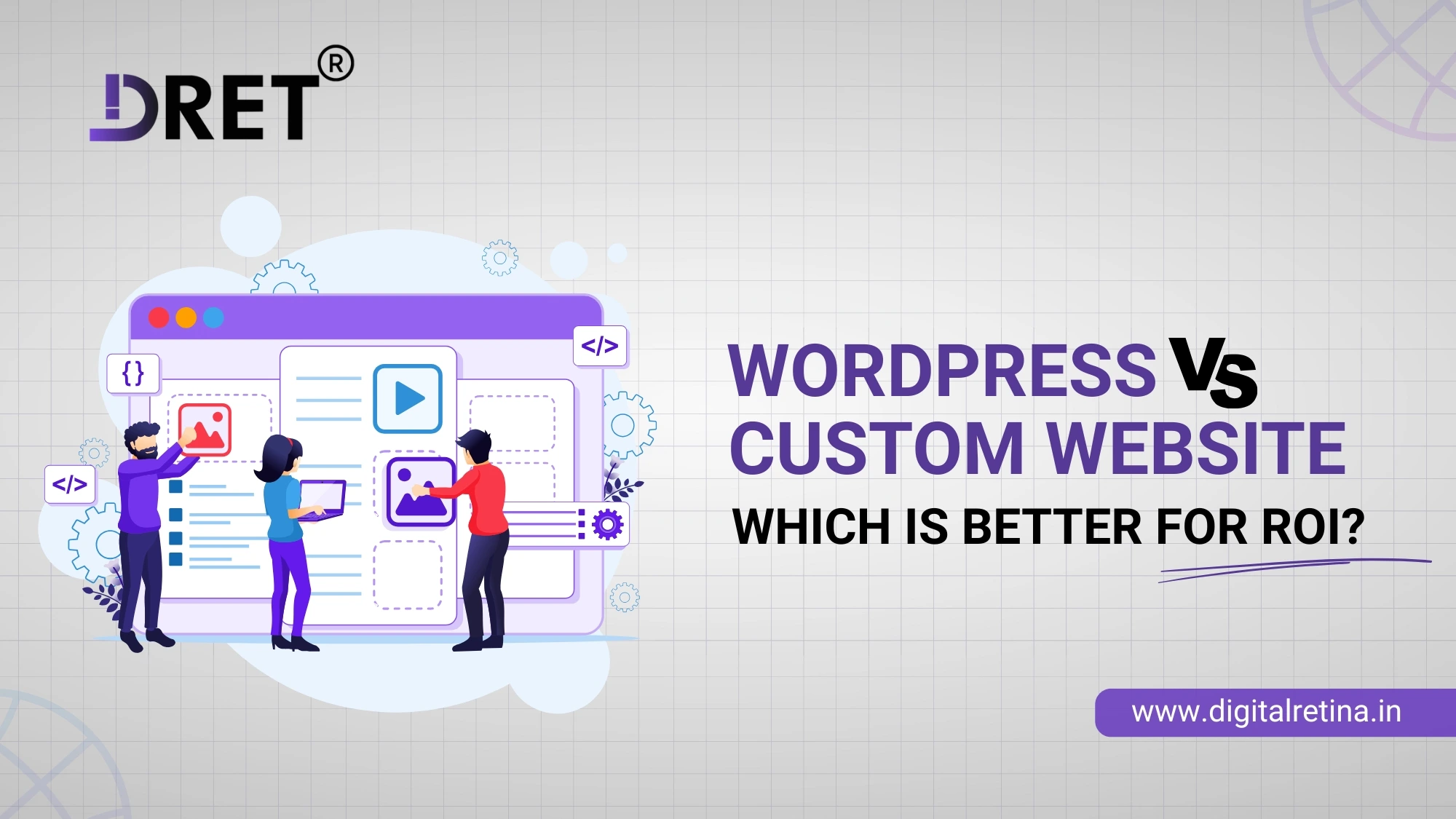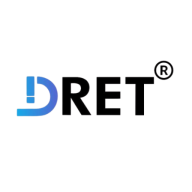
When it comes to building a business website that delivers real ROI, one of the biggest decisions is choosing between WordPress and a Custom Website. Both options can help your brand grow online—but the right choice depends on your goals, budget, scalability needs, and long-term marketing strategy.
WordPress offers flexibility, speed, and affordability. It’s perfect for businesses that want to launch quickly, manage content easily, and scale using plugins without heavy upfront investment—especially when supported by professional Web Development services. On the other hand, a Custom Website provides complete control over design, performance, and functionality, making it ideal for brands that require unique features, robust security, and long-term scalability through tailored Web Development services.
What is WordPress?
WordPress is an open-source Content Management System (CMS) that enables individuals and businesses to build websites using pre-designed themes, plugins, and a drag-and-drop-like interface. It is widely used because of its flexibility, affordability, and ease of use—even for non-technical users.
Key Strengths of WordPress:
• User-friendly Dashboard: Easily manage content, blogs, pages, and media.
• Huge Plugin Ecosystem: Add features like forms, SEO tools, eCommerce, and security with one click.
• Theme Variety: Thousands of free and premium themes for different industries.
• SEO-Friendly Structure: Supports SEO plugins like RankMath and Yoast.
• Fast Deployment: Websites can go live within days instead of weeks or months.
Limitations of WordPress:
• Performance Drops: Heavy themes and plugins can slow down your website.
• Plugin Dependency: Too many plugins lead to security risks and maintenance issues.
• Security Concerns: Hackers often target outdated themes and plugins.
• Design Restrictions: Meaningfully changing theme structure can cause conflicts.
Types of Projects Best Suited for WordPress
WordPress is perfect when you want speed, affordability, and easy management. It’s especially ideal for small- to medium-sized businesses and content-focused websites.
Best Use Cases:
1. Blogs & Content Websites
Perfect for publishing articles, managing categories, and ranking on Google. Ideal for creators, educators, and businesses using content marketing.
2. Small Business Websites
Great for businesses needing essential pages like Home, About, Services, and Contact. Easy to maintain and update without technical skills.
3. Portfolio & Creative Sites
Photographers, designers, agencies, and freelancers can showcase their work visually using portfolio themes, sliders, and galleries.
4. Service & Appointment-Based Websites
Ideal for clinics, salons, consultants, and local services. WordPress supports appointment systems, booking plugins, and enquiry forms.
5. Basic eCommerce Stores
WordPress + WooCommerce works well for small product catalogs, boutique stores, and niche brands that don’t need heavy custom features.
6. Lead Generation Websites
Businesses running Meta Ads or Google Ads can build high-converting landing pages quickly using Elementor, Divi, or Bricks. Integrates easily with CRMs and automation tools.
Why WordPress Provides Good ROI for These Projects:
• Low upfront investment → Faster ROI
• Quick development → Go live and start marketing immediately
• Easy to scale content → Boost SEO over time
• Affordable maintenance → Lower long-term cost
If your priority is quick online visibility with minimal investment, WordPress is ideal.
What is a Custom Website?
A custom website is built from scratch using programming languages and frameworks like HTML, CSS, JavaScript, React, Node.js, PHP, Laravel, etc. Every design element, feature, and interaction is crafted according to your business strategy, user journey, and brand identity—without relying on pre-built themes or plugins.
Key Strengths of Custom Development:
1. Fully Tailored Design
You get a unique, brand-specific UI/UX crafted after research, wireframes, and prototyping.
No restrictions from templates—every section, animation, and user journey is purpose-built.
2. High Performance
Custom websites use lightweight, optimised, and clean code, resulting in:
• Faster load times
• Better Core Web Vitals
• Improved SEO & user retention
• Smooth performance even with complex features
3. Greater Security
Since there are no unnecessary plugins, custom sites avoid typical vulnerabilities.
Developers can implement enterprise-grade security, including:
• Custom authentication
• Encrypted databases
• Secure APIs
• Firewall protection
• Role-based access control
This makes custom builds ideal for finance, healthcare, SaaS, and enterprise systems.
4. Unlimited Functionality
Custom development supports any level of innovation. You can build:
• Custom dashboards
• Online booking systems
• CRM or ERP modules
• Multi-vendor marketplaces
• Learning management systems (LMS)
• Customer portals
• Subscription systems
• AI-powered tools and automation
There are no restrictions on features, integrations, or workflows.
5. Superior Scalability
Custom-built systems are designed to grow with your business.
They handle:
• Higher traffic
• Larger databases
• More complex logic
• Future feature expansion
Perfect for businesses planning long-term digital growth.
Types of Projects Best Suited for Custom Development
Custom development is the ideal choice for businesses that aim for long-term digital growth, advanced functionality, and maximum performance. It’s perfect for brands that need more than just an online presence—they need a high-performing digital system tailored to their operations.
1. Large-Scale Business Websites
Ideal for established brands and enterprises that require:
• Custom UI/UX tailored to brand identity
• Optimised speed and high Core Web Vitals
• Advanced security standards
• Multi-location or multi-service structures
These websites often include custom animations, multilingual support, role-based dashboards, and specialised features that templates can't handle.
2. SaaS Platforms & Web Applications
Custom development is essential for building:
• Subscription-based SaaS tools
• Customer dashboards
• Internal CRMs & ERPs
• Booking and scheduling systems
• Workflow automation portals
• Online calculators or interactive tools
These systems require secure databases, custom logic, and scalable architecture, which only custom development can provide reliably.
3. Enterprise-Level e-commerce Stores
For businesses with large inventories or complex sales processes, custom development supports:
• Custom checkout flows
• Dynamic pricing rules
• Multi-vendor setups (like marketplaces)
• ERP/WMS/Logistics integrations
• Advanced product filters
• Personalised product recommendations
This ensures faster load times, fewer plugin dependencies, and greater control over conversion optimisation.
4. High-Traffic Commercial Websites
Perfect for platforms expected to handle thousands of users at a time, such as:
• News & media portals
• Online learning platforms
• Real estate aggregators
• Multi-category marketplaces
Custom development ensures stability, optimized content delivery, and smooth performance under heavy load.
Why Custom Websites Deliver Higher ROI for These Projects?
Long Lifespan (5–7+ Years)
Custom websites remain future-proof longer because they don’t rely on outdated themes or plugin limitations.
Higher Conversion Rates Through Optimized Experience
Everything is designed for user behavior—leading to better engagement and more conversions.
Stronger Brand Differentiation
Your website looks and works uniquely, giving your brand a premium digital presence that competitors can’t copy easily.
Superior Performance = Better SEO & Paid Ads
Fast load times, clean architecture, and optimized UI/UX improve:
• SEO rankings
• Google Ads quality score
• Meta Ads landing page performance
Custom Integrations Reduce Operational Costs
Automations and tailored features minimize repetitive tasks and reduce dependency on third-party tools.
Comparison of WordPress vs Custom Websites
WordPress is quick and budget-friendly, while custom websites offer better performance, security, and long-term scalability. Simply put, WordPress suits fast launches, but custom development delivers stronger long-term ROI.
1. Development Cost & Investment
WordPress is budget-friendly and allows businesses to launch quickly using themes and plugins, making it ideal for startups and small companies. Custom websites cost more upfront because everything is built from scratch, but they offer long-term value and flexibility for businesses expecting growth.
ROI Insight: WordPress works well for quick ROI; custom websites deliver better long-term returns.
2. Speed & Performance
WordPress performance depends heavily on the theme and number of plugins installed, which can slow the site if not optimized properly. A custom website, however, is built with clean, efficient code designed for speed from the beginning.
ROI Insight: Faster, smoother websites lead to better conversions—custom development performs stronger.
3. SEO Capabilities
WordPress supports SEO with easy plugins and a content-friendly setup, but excessive plugins can create code bloat. Custom websites use lightweight architecture, making them ideal for advanced technical SEO and competitive industries.
ROI Insight: Both rank well, but custom sites offer stronger technical SEO advantages.
4. Security & Reliability
WordPress relies on plugins and frequent updates, which can introduce vulnerabilities if ignored. Custom websites are far more secure because developers control every part of the code and can implement tailored security measures.
ROI Insight: Better security means fewer risks, less downtime, and stronger long-term reliability.
5. Scalability & Growth
WordPress struggles with heavy traffic or large feature requirements because it depends heavily on plugins. Custom websites are designed to scale, handle growth, and support complex systems without performance drops.
ROI Insight: Custom sites support long-term scalability far better than WordPress.
6. Design Flexibility
WordPress themes limit design freedom and often result in similar-looking websites, while custom sites allow complete creative control, giving brands a unique and premium digital presence.
ROI Insight: Unique design boosts trust, branding, and conversions.
7. Maintenance Costs
WordPress needs regular updates, plugin management, and security checks, which creates ongoing maintenance work. Custom websites have fewer issues because the code is stable and streamlined.
ROI Insight: WordPress has recurring micro-costs; custom websites are more stable and cost-effective over time.

Final Verdict: Which is Better for ROI?
Choose WordPress If:
• You have a small budget
• You need a website quickly
• Your needs are standard (service, portfolio, basic eCommerce)
• You want to manage your website yourself
Choose a Custom Website If:
• You want a long-term digital asset
• You need custom functionality
• You want high performance, security, and scalability
• You want a unique brand impression
• You are planning to scale your business
💡 For long-term ROI, custom websites always outperform.
For short-term, low-cost ROI, WordPress is a solid choice.
Why Choose DRET for Your Website?
At DRET, we focus on ROI-driven development, whether it's WordPress or custom coding.
What We Deliver:
• High-performance, super-fast websites
• SEO-focused development
• Conversion-optimized UI/UX
• Security-first architecture
• Scalable custom solutions
• Long-term support and maintenance
• Transparent pricing
We make sure your website is not just visually appealing—but a profitable asset that drives leads, sales, and brand authority.
Ready to Implement These Strategies?
Our team of digital marketing experts can help you navigate these trends and create a winning strategy.




